
The Secretariat, officially the Secretariat of the Central Committee of the Communist Party of China, is a body serving the Chinese Communist Party (CCP)'s Politburo and Standing Committee. The secretariat is mainly responsible for carrying out routine operations of the Politburo and coordinating organizations and stakeholders to achieve tasks set out by the Politburo. It is empowered by the Politburo to make routine day-to-day decisions on issues of concern in accordance with the decisions of the Politburo, but it must consult the Politburo on substantive matters.
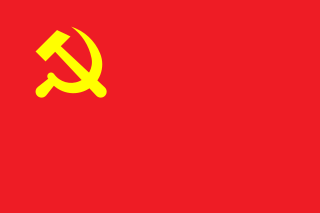
The Chairman of the Central Committee of the Chinese Communist Party was the leader of the Chinese Communist Party. The position was established at the 8th National Congress in 1945 and abolished at the 12th National Congress in 1982, being replaced by the general secretary. Offices with the name Chairman of the Central Executive Committee and Chairman of the Central Committee existed in 1922–1923 and 1928–1931, respectively.
The Chinese New Left is a term used in the People's Republic of China to describe a diverse range of left-wing political philosophies that emerged in the 1990s that are critical of the economic reforms instituted under Deng Xiaoping, which emphasized policies of market liberalization and privatization to promote economic growth and modernization.
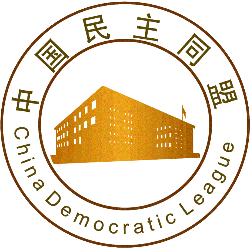
The China Democratic League (CDL) is one of the eight minor political parties in the People's Republic of China under the direction of the Chinese Communist Party. The CDL was originally founded in 1941 as an umbrella coalition group of the Chinese National Socialist Party, the Chinese Youth Party and the Chinese Peasants' and Workers' Democratic Party to fight the Imperial Japanese Army while providing for a "Third Force".
The Chinese Peasants' and Workers' Democratic Party (CPWDP) is one of the eight minor political parties in the People's Republic of China under the direction of the Chinese Communist Party. The party is a member of the Chinese People's Political Consultative Conference. It is the fifth-ranking minor party in China. The current chairman is He Wei.
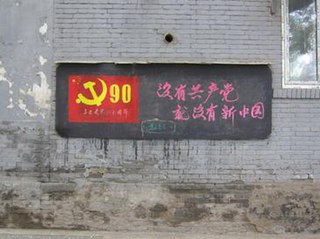
"Without the Communist Party, There Would Be No New China" is a Chinese Communist Party song, which originated in 1943 in response to the phrase, "Without the Kuomintang there would be no China".

The CentralSocial Affairs Department was the intelligence and counter-intelligence agency of the Chinese Communist Party Central Committee from 1939 to 1949, prior to the establishment of the People's Republic of China.

The Maoist Communist Party of China (MCPC) is an underground communist party in China adhering to Marxism–Leninism–Maoism. The party was established in 2008 by Chinese leftists against economic reforms pursued by the Chinese Communist Party (CCP). Its founders were arrested in Chongqing in 2009.

The Young Pioneers of China, often shortened to the Young Pioneers and sometimes translated into English as Red Pioneers, is a mass youth organization for children aged six to fourteen in the People's Republic of China. The Young Pioneers of China is run by the Communist Youth League, an organization of older youth that comes under the Chinese Communist Party (CCP). The Young Pioneers of China is similar to Pioneer Movements that exist or existed in many Communist countries around the world.
The Zhi Xian Party, also known as the Chinese Constitutionalist Party in English, is an unregistered political party in China. It was founded in 2013 by people who support the Chinese Communist Party's position as the country's ruling party, but who also seek a return to a Maoist model and an end to what they consider violations of the national constitution by the Communist Party. Bo Xilai was elected the party's "Chairman for Life", because the party considered the trial against him unjust. The party was banned in December 2013.
Shi Taifeng is a Chinese politician currently serving as the head of the United Front Work Department (UFWD) of the Central Committee of the Chinese Communist Party (CCP) and the first-ranking vice chairperson of the Chinese People's Political Consultative Conference (CPPCC). He is additionally a member of the CCP Politburo and a secretary of the CCP Secretariat.

Fu Zhong was a general in the People's Liberation Army of the People's Republic of China from Sichuan.
Song Qingwei was a general in the People's Liberation Army of China who was a political commissar of the Jinan Military Region from 1987 to 1994.
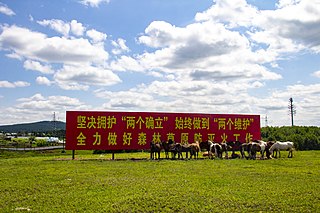
"Two Establishes" (两个确立) and "Two Upholds" (两个维护) are two political slogans established by the Chinese Communist Party to reinforce general secretary Xi Jinping's rule.
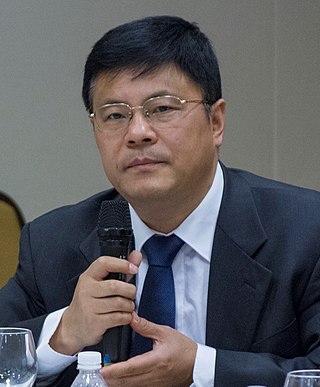
Xie Chuntao is a Chinese writer and politician currently serving as vice president of the Central Party School of the Chinese Communist Party.
Zheng Xincong is a Chinese politician, currently serving as director of the Macau Liaison Office.
Hou Kai is a Chinese politician, currently serving as auditor-general of the National Audit Office. He is a member of the Standing Committee of the Central Commission for Discipline Inspection since November 2012.
Huang Jianfa is a Chinese politician, currently serving as a deputy head of the Organization Department of the Chinese Communist Party. He served as deputy party secretary of Zhejiang and secretary of the Political and Legal Affairs Commission of the CCP Zhejiang Provincial Committee.

"One institution with two names" is a bureaucratic arrangement in the Chinese government wherein a government agency exists in name only, and its functions are in practice performed by another agency or a Chinese Communist Party (CCP) organization, so that in effect one institution has two or more governmental brands or trade names to use selectively for political, historical, or bureaucratic reasons. This type of arrangement was historically common until the mid-1980s, but has been extensively revived by reforms which began in 2017.
Fang Weizhong is a Chinese politician who served as chairperson of the Economic Affairs Committee of the Chinese People's Political Consultative Conference from 1993 to 2003.














